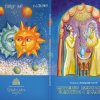The book on Christian Heritage of Kosovo and Metohija was presented in Paris on Monday, June 29, 2015, at 19h at l'Auditorium Jean XXIII de la Mutuelle Saint-Christophe, 277 rue Saint-Jacques.
Bishop Maxim of the Western American Diocese spoke about the theological and historical significance of the book. Raphaëlle Ziadé, a specialist of the byzantine art, from Réunion des Musées nationaux, explained some of the most prominent aspects of the Serbia's medieval visual art in Kosovo and Metohija. She emphasized particulary the a new humanism which characterizes these works, and it was this style that served as a basis for what Gabriel Millet termed “the Byzantine Renaissance.” Jean-François Colosimo, director of Editions du Cerf offered a wider perspective on the position of Christians in the Middle East.
.The artistic and religious musings on Kosovo's medieval art are compelling, yet, as in Colosimo equally remarked, they also posess an academic value and critical sharpness of description. Jacques Hogard, colonel and former commander of the special forces in Kosovo gave a sober and eye-opening assessment of his experience and the fiasco of NATO mission in Kosovo and Metohija and the true nature of the Western involvement in Serbia's southern province. Jean-Christophe Buisson, chief of the cultural redaction of Figaro Magazine emphasized that this book is one of the most extraordinary documents of the history of the Serbian destiny in Kosovo. He also quited from the book of Hieromoin Athanase, “Dossier Kosovo”. Dr. Ljubomir Mihailovic, moderator of the event, explicitly invoked the notion of a universal prominence of Serbia’s heritage in Kosovo and Metohija.
There are some claims that this monograph represents a monumental step forward in illuminating the Christian heritage of Kosovo and it will have profound impact on our understanding of the future of Europe. The publication should infiltrate into culture and revivify among intellectuals a feeling for the aesthetic heart of the Serbian people in Kosovo and Metohija.
The event was organized by the Serbian Western Diocese for Europe in cooperation with Mutuelle d’Assurance Saint Christophe et Orthodoxie.com.




